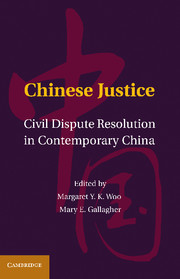Book contents
- Frontmatter
- Contents
- Tables and Figures
- Contributors
- Acknowledgments
- Abbreviations
- Glossary
- Introduction
- PART I LEGAL DEVELOPMENT AND INSTITUTIONAL TENSIONS
- 1 From Mediatory to Adjudicatory Justice: The Limits of Civil Justice Reform in China
- 2 Judicial Disciplinary Systems for Incorrectly Decided Cases: The Imperial Chinese Heritage Lives On
- 3 Legalizing the Local State: Administrative “Legality” at China's Grassroots
- 4 Economic Development and the Development of the Legal Profession in China
- PART II PU FA AND THE DISSEMINATION OF LAW IN THE CHINESE CONTEXT
- PART III LAW FROM THE BOTTOM UP
- Conclusion: Chinese Justice from the Bottom Up
- Index
- References
4 - Economic Development and the Development of the Legal Profession in China
Published online by Cambridge University Press: 05 July 2011
- Frontmatter
- Contents
- Tables and Figures
- Contributors
- Acknowledgments
- Abbreviations
- Glossary
- Introduction
- PART I LEGAL DEVELOPMENT AND INSTITUTIONAL TENSIONS
- 1 From Mediatory to Adjudicatory Justice: The Limits of Civil Justice Reform in China
- 2 Judicial Disciplinary Systems for Incorrectly Decided Cases: The Imperial Chinese Heritage Lives On
- 3 Legalizing the Local State: Administrative “Legality” at China's Grassroots
- 4 Economic Development and the Development of the Legal Profession in China
- PART II PU FA AND THE DISSEMINATION OF LAW IN THE CHINESE CONTEXT
- PART III LAW FROM THE BOTTOM UP
- Conclusion: Chinese Justice from the Bottom Up
- Index
- References
Summary
The development of the legal profession in China since 1978 has been largely a modernization story of economic development. The transition to a market economy stimulated the demand for lawyers. Conversely, lawyers contributed to economic growth, both directly through their work on commercial transactions and protecting property rights, and indirectly by promoting, along with other legal professionals, legal reforms aimed at implementing rule of law and establishing the institutions necessary for a market economy. As such, the development of the legal profession and its relationship to the market in China is broadly consistent with experiences in other countries.
However, whereas China and other East Asian countries lend support to modernization theories, they have also diverged from the more classical straight-line versions whereby all states end up with Euro-American liberal democracy. Hong Kong, Singapore, Japan, South Korea, and Taiwan are all economically wealthy countries with legal systems that rank high on rule of law indices and protect both property and non-property rights reasonably well. Yet some of them continue to be nondemocratic, or somewhat dysfunctional democracies, and on the whole less liberal than their economically advanced Western counterparts. Moreover, these East Asian states have not always followed the prescribed path with respect to political reforms, economic policy, or institutional development, including the development of the legal profession.
Much of the concern of Western scholarship on the legal profession in China, and East Asia more broadly, has been on the role of the legal profession in political reforms.
- Type
- Chapter
- Information
- Chinese JusticeCivil Dispute Resolution in Contemporary China, pp. 114 - 136Publisher: Cambridge University PressPrint publication year: 2011
References
- 3
- Cited by



